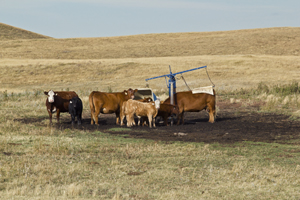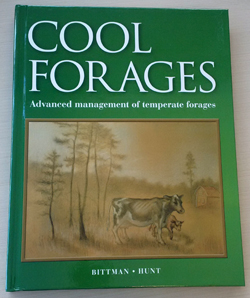Managing Native Forages: Webinar April 6
Remarque : cette page web n’est actuellement disponible qu’en anglais.
Update: Missed the webinar? Find the recording and check for future webinars on our Webinars page
Join this webinar to learn about strategies to help establish and maintain native forages for high yields and animal performance.
When
Thursday April 6, 7:00 pm MDT

- 6:00pm in BC
- 7:00pm in AB and SK
- 8:00pm in MB
- 9:00pm in ON and QC
- 10:00pm in NS, NB and PEI

Door Prize!
Producers that attend this webinar will be entered to win a copy of Cool Forages: Advanced management of temperate forages ($60 value).
Interested but aren’t available that evening?
Register anyway! This webinar will be recorded and posted online at a later date. All registrants will receive a link to the recording and additional learning resources. By attending the live event, you’ll have the opportunity to interact and ask questions too.
Watching on a tablet or mobile device?
If you plan to join the webinar using your tablet or mobile device, you will need to download the appropriate receiver. We recommend that you join the webinar 15 minutes early as you will be prompted to download the receiver once you log in, which may take several minutes to complete. To download the receiver ahead of time, visit: http://www.citrix.com/go/receiver.html
Duration
Approximately 1 hour.
Cost
BCRC webinars are available and free of charge thanks to guest speakers who volunteer their time and expertise to support advancements in the Canadian beef industry, and through the Knowledge Dissemination and Technology Transfer project funded by the Canadian Beef Cattle Check-off and Canada’s Beef Science Cluster.
Speaker
Alan Iwaasa PhD,
Dr. Iwaasa is a Grazing Management/Ruminant Nutrition Research Scientist at Agricultlure & Agri-Food Canada in Swift Current, SK (SPARC). Dr. Iwaasa obtained his Ph.D. in Ruminant Nutrition from the University of Guelph, with Undergraduate and Masters degrees from the University of Saskatchewan. Dr. Iwaasa started his career in 2000 at Agriculture and Agri-Food Canada – SPARC (Swift Current) – and has been there ever since. He is also an Adjunct Professor with the Dept. of Animal & Poultry Science at the University of Saskatchewan. Alan was raised on a grain and cattle farm in southern Alberta and his current research interests includes native and tame grazing pasture management, animal-plant grazing interface relationships, assessing and improving forage quality, ruminant nutrition and development of economical and environmentally sustainable grazing systems. Alan is married and has two boys.
What is a webinar?
Webinars are just like attending a workshop or conference, but from the comfort of your own home or office. We bring the presentation right to you. They’re easy to join and participate in. A reliable, high-speed internet connection is required.
All you need to do is register beforehand, and about 5-10 minutes before the webinar is scheduled to begin, click the link you were provided when you registered. Then turn up your computer speakers or call the phone number provided. That’s it! Sit back and enjoy. As a participant, you can anonymously answer polls and surveys, and will have the opportunity to ask questions near the end of the webinar.
Don’t have high-speed internet? Consider calling a neighbor that does and watch the webinar together, or call your regional ag office to ask whether arranging a group viewing is possible.
Visit our Webinars page to find other upcoming BCRC webinars and the recordings of our past sessions.

Click here to subscribe to the BCRC Blog and receive email notifications when new content is posted.
The sharing or reprinting of BCRC Blog articles is welcome and encouraged. Please provide acknowledgement to the Beef Cattle Research Council, list the website address, www.BeefResearch.ca, and let us know you chose to share the article by emailing us at info@beefresearch.ca.
We welcome your questions, comments and suggestions. Contact us directly or generate public discussion by posting your thoughts below.
